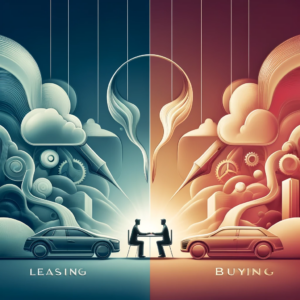
Do Car Dealers Prefer Lease or Buy? Understanding Dealership Preferences
When stepping into a car dealership, you’re not just faced with the decision of which car to choose but also whether to lease or buy it. This choice not only affects your financial commitments but also ties into what dealerships might prefer. Additionally, questions often arise regarding the fate of leased cars—specifically, do dealerships buy them back? This article delves into these inquiries, offering insights into dealership preferences and practices.
Lease vs. Buy: What Do Dealers Prefer?
The Business Behind Leasing and Buying
Dealerships operate with the goal of maximizing profit, but how they achieve this can vary based on whether a customer leases or buys a vehicle. Each option offers different financial and operational benefits to a dealership.
Why Dealers Might Prefer Leasing
- Repeat Business: Leasing encourages customers to return to the dealership at the end of their lease term, presenting opportunities for repeat sales or new leases.
- Pre-Owned Inventory: Off-lease vehicles can enrich a dealer’s inventory of pre-owned cars, which can be sold for a profit.
- Higher Profit Margins: Leases often include fees and terms that can be more profitable for dealers, such as higher finance charges or end-of-lease fees.
The Appeal of Selling Cars
- Immediate Sales Revenue: Selling a car results in immediate and full revenue from the sale, bolstering the dealership’s financials.
- Manufacturer Incentives: Dealers may receive bonuses from car manufacturers for selling new vehicles, incentivizing them to push for sales over leases.
- Customer Loyalty: Buyers who are satisfied with their purchase are likely to return for servicing and future car purchases, though this can also apply to leasing.
Do Dealerships Buy Leased Cars?
At the end of a lease term, there are several paths a leased vehicle can take, and one common question is whether dealerships buy these cars.
End-of-Lease Options
- Return to Dealer: Most commonly, leased vehicles are returned to the dealership. Here, the dealer has the option to purchase the vehicle from the leasing company (often a financial arm of the manufacturer) and then sell it as a certified pre-owned vehicle.
- Lease Buyouts: In some cases, the lessee decides to buy the leased vehicle at the end of the term. Dealerships facilitate this process and may even finance the buyout.
- Auction or Sale to Another Dealer: If the dealership decides not to buy the leased car, it might be auctioned off or sold to another dealer.
What This Means for Consumers
Understanding dealerships’ preferences and practices around leasing and buying can empower consumers to make informed decisions. Knowing that dealers might have a vested interest in one option over the other allows for better negotiation and ensures that the chosen option aligns with the consumer’s financial and lifestyle needs.
Conclusion
While dealers may have preferences based on business models, incentives, and market conditions, the decision to lease or buy should ultimately reflect the consumer’s priorities. Whether prioritizing flexibility and lower upfront costs through leasing or the long-term value and ownership that comes with buying, consumers should weigh these factors against their personal circumstances and goals.
FAQs
- Do car dealers make more money on leases or sales?
– Dealers can profit from both, but the structure of the profit varies. Leases may offer ongoing revenue through fees and future transactions, while sales provide immediate revenue and potential manufacturer incentives.
- Can I negotiate the buyout price of a leased car?
– The buyout price is typically set in the lease agreement, but there’s room for negotiation on the purchase of a new car or the terms of a new lease.
- Is it better to lease or buy a car from a financial perspective?
– It depends on your financial situation and goals. Leasing can offer lower monthly payments, while buying can be more cost-effective in the long run.
- What happens to leased cars that dealerships buy?
– These cars often become part of the dealership’s certified pre-owned inventory, which can be a good option for buyers seeking a used car with a warranty.
- Can I return my leased car to any dealer?
– Typically, you should return your leased car to an authorized dealer of the same brand. However, policies can vary, so it’s best to check your lease agreement or with the leasing company.
Need a car?
You can find the best used car financing and leasing terms in London and Cambridge Ontario from us at ezeecredit.com
